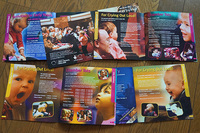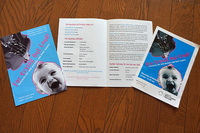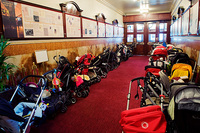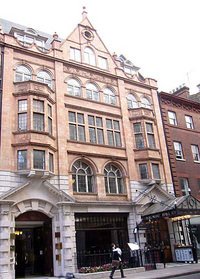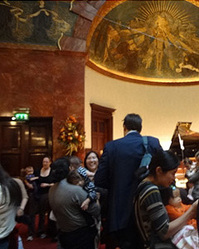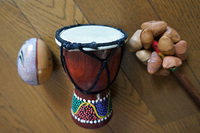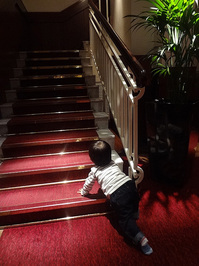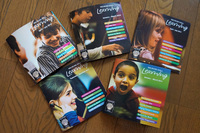English
Classical music concerts for babies No.2
I discussed in the last article what it means for mothers with young babies to attend a classical music concert. From this article, I would like to introduce three concert projects which have become popular in London. The first case is two concert events for babies and toddlers held at Wigmore Hall .
Situated in the heart of London, a high-class chamber concert hall, Wigmore Hall, is famous not only for world-class chamber music concerts but also for its rich learning programmes. There are lectures and pre-concert talks for adults, participatory workshops for school-children which involve various collaborations with other art genres, chamber music concerts and workshops for toddlers from 2-5 years old, 'Chamber Tots', which is very popular at the hall and in the community, and so on. In 2008, two projects were added to the list: 'For Crying Out Loud!' for newborn babies, and 'Toddler Bop' for 1-2 year old toddlers
- Target:
- Parents and babies under 1 year old
- Venue:
- Main hall of Wigmore Hall
- Date and time:
- About 6 days per year, 11:00-11:45
- Fee:
- £6 per adult - babies come for free (booking necessary)
- 参照:
- www.wigmore-hall.org.uk/whats-on/series/for-crying-out-loud-0
- Target:
- Toddlers aged 1-2 years old and their guardians
- Venue:
- Bechstein Hall of Wigmore Hall
- Date and time:
- About 3 days per year, 10:15-11:00/ 11:45-12:30
- Fee:
- £6 per child - no ticket required for accompanying adult (booking is necessary)
- 参照:
- www.wigmore-hall.org.uk/whats-on/series/toddler-bop-0
Wigmore Hall's new addition, 'For Crying Out Loud!', is a classical concert to which you can bring your baby aged up to 12 months old It is held in the main hall. From its name, it seems that you can dispel the suspicion that you will have to rush out of the hall immediately your baby start crying. Is this true?
I parked my pushchair at the entrance and brought my baby and bag into the seat in the main hall. Then I realized that I had never brought such a big bag into a seat in the hall before. There was a feeding cape, towel, baby milk, toys, nappies and a change of clothes all ready within arm's length, as you do not have time to go and find them in the buggy park with your baby in your arms when they are needed. I took seats for us both and for my bag, next to the isle, so that I could leave if necessary. Other parents thought the same thing, so a 'full house' did not mean 100% packed, but about 1/3 of the ground floor seats were filled, allowing every parent some space, so every concert sold out very quickly. Parents were welcome to feed their baby, or walk around as they needed to during the concert, and play mats were provided for babies who needed a bit of a wriggle during the event.
A 45-minute-long concert was provided by the artists on the stage. The artists of this series were student musicians at the Royal Academy of Music. The concert I first brought my baby to at 5 months old was performed on a piano and cello, and the second time, when he was 10 months old, it was by a piano quartet. There was also other chamber music, such as violins, flutes, singers, and also jazz. The performers and programmes had not yet been announced when I booked the ticket, so it is more like booking 'an opportunity' rather than 'what you would like to listen to'.
After a brief introduction to the pieces on the programme, the musicians started playing. As soon as the music filled the hall, I was caught by a sense of being wrapped in small bubbles of music, and literally burst into tears. How long has it been since I last felt like this? It was like a flashback of an experience of a live concert at the hall. The programme was designed for adults than babies, such as Brahms' piano quartet. Then I realized that, despite my initial intention for my baby to have a live high-quality music experience, it was in fact a special occasion for myself as a mother.
I felt like 'I was being treated as an adult musically' for the first time since I had my baby. I really like to sing nursery rhymes with children in the way children like. I don't have any problem with that. But whenever and wherever you go with your baby, it is filled with nursery rhymes. Even when you are not singing them, you are listening to them in your mind unconsciously. The sound of live classical music sent fresh air to that kind of life and helped me regain my identity and time as an adult. I assume that everyone in the audience felt this, even if they were not a classical music lover.
What made the baby concert at Wigmore Hall so special was that you could listen to the music in a world-class concert hall. The vivid flashback I felt must be the kind of effect that a fine concert hall can have. The manner in which the musicians performed, the divine atmosphere and interior of the main hall, and the programme and performance which pleased the aesthetic sense of the adult audience, all led the audience into the world of music proper. It may sound strange, but the fact that all of the audience had babies of the same age group made me feel equal to everyone else and helped me to enjoy the music,
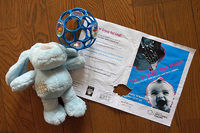
Bringing own toys. Bitten programme paper unlike the time when I brought my baby with me to an adult-only audience and felt timid about it all through the concert. As for my son, he enjoyed looking around the interior of the hall, gazing at the musicians on the stage, and listening to the music quietly. Even when he grew slightly bored, he just chewed my programme and played with his toys quietly with the other babies sitting in the aisle, and I did not have to take him out of the hall at all. Some babies fell asleep in their mother's arms listening to the music.
Does the intention of the programme match what I felt? I asked Ursula Crickmay, Director of Learning at Wigmore Hall, about the aim of the programme.
―Who is the main target of this series?
'For Crying Out Loud is aimed primarily at parents rather than babies. The aim is to give the parents of young children access to high quality chamber music and song. For this reason, the focus is on presenting a varied and enjoyable programme for people who may or may not have attended many concerts before. Having said this, the music is carefully considered so that there is nothing that will prove stressful for children, the durations are generally limited, and we are pleased that there are often moments when babies and adults alike are held by the music.'
―How do you ask the musicians to choose the pieces they play?
'As described above, some considerations for the musicians are: Is the programme varied and enjoyable?: Is it accessible both to audiences who are familiar with chamber music, and to those who may be attending a classical concert for the first time?: Is there anything about the music that might be stressful for the babies - in which case, don't include it!: Are the pieces reasonably short so that they don't demand a huge attention span from an audience who is likely to be regularly distracted!
Generally when choosing a repertoire to play to young children of any age (from babies up to primary school children), we find that the musician's connection with the music and ability to communicate it is much more important than whether it is 'simple' or 'childlike' - we find that, within reason, children will listen with open ears to music that many adult audiences would find more challenging.'
―How do you arrange the musicians?
'The musicians for 'For Crying Out Loud' are from the RAM. We run the series in collaboration with the 'Open Academy' - the outreach department of the RAM. It is an opportunity for them to perform on the Wigmore Hall stage, and this is an experience that many of their ensembles are keen to get. Ensembles are put forward by the RAM and we audition them to select 2-3 each term. All of the students receive guidance and mentoring from the Head of the Open Academy.'
Surely, you can't concentrate on the performance 100% when you have to care about your baby. It makes sense that people say it is better to leave your child with a baby-sitter if you really want to enjoy the music. However, the reality is, as I mentioned last time, that there is no guarantee that a mother can genuinely immerse herself in music in that situation, and it may be better to have her baby at her side and so be able to enjoy the concert from the bottom of her heart. Even in a world-class concert hall, during 'For Crying Out Loud!', people embrace the situation with a smile, whether some babies are crying, people are walking around, or babies are playing on the play mats or in the aisles. When you feel that kind of atmosphere, you can enjoy your baby's giggling and wriggling response to the music and the glittering interior of the hall, instead of thinking 'Shhh...Be still!' all the time. It may be because the parents embrace their baby's response as it is, I didn't see any baby constantly crying and screaming, or any parent who was desperate to calm their baby. Instead, I saw many happy faces on the parents who are pleased to discover that their baby can enjoy the music more than they expected.
'Toddler Bop' is designed for toddlers from 1 year old until they can attend 'Chamber Tots'. While 'For Crying Out Loud!', for babies up to 12 months old, is a classical music concert in the main hall, and 'Chamber Tots', for children aged 2-5 years old, is a combination of a concert and a workshop, 'Toddler Bop' for children aged 1-2 years takes the form of a workshop.
It takes place in the Bechstein Room in the basement, not in the main hall. The room is used to serve drinks during the intervals of concerts, for pre-concert talks and lectures with chairs, and for workshops without chairs.
We also attended 'Toddler Bop'. When we stepped into the room, we found some folk percussion instruments placed on the floor. Being drawn to those instruments, we gathered in the middle in a circle and the workshop started from there naturally. There was a workshop facilitator who has led 'Chamber Tots' for several years and a violist who offered live music when needed.
During the workshop, the participants could touch and play these folk instruments and listen to the violin nearby, so the musical instruments were always at arm's length. Guided by the leader, the participants made sounds on an instrument in front of them in turn in a circle and found out what they sound like; they made different kinds of sounds according to the gestures of the leader, such as, fast-slow, loud-quiet; and passed on the sound to the next person slowly or very quickly. In the story-telling part, the leader walked around the room telling the story, encouraging the participants to look for some animal puppets throughout the story, mimic the noise of the animal and sing a song about it. It was an easier version of 'Chamber Tots', with lots of participatory elements.
By contrast to 'For Crying Out Loud!', 'Toddler Bop' is aimed primarily at the children. After their first birthday, children become very active and start moving around, which makes it difficult to hold a baby in one's arms for 45 minutes on a seat, unlike babies under 1 year old. Instead, they develop an interest in interactive activities, and are able to move their body in response to sounds and simple directions and try out simple tasks. Yet, they are too young to understand the structure of the story or engage in verbal communication, so it keeps it very simple. As for listening to the musical piece, they listen to a short piece and nothing more or longer. The approach here has been informed by working in early years settings for over a decade and the rigorous reflection and research that has accompanied this. In this case, the musician engages in a much more interactive and playful way - singing, and using percussion and exploration through musical play-, so a performance from the stage would not be appropriate.
I asked Ursula about the background to the launch of these new series of events for babies.
―What made you decide to add events for babies and toddlers to the learning programme of the Wigmore Hall?
'Wigmore Hall has had a long-standing commitment to working with its youngest audiences. 'Chamber Tots' - music and movement workshops for 2-5 year olds - was launched in 1998, in response to a perceived gap in the provision of high quality music-making opportunities for this age group. Since then, the workshops - around 7 per term - have continued to be a sell-out, and in 2000 the Community programme was launched which has taken the workshops to almost 100 nurseries across London.'
'For Crying Out Loud was added to the programme in 2008, and I have to admit a personal motivation here: when I had my first baby in 2007, I discovered that I couldn't attend any classical music concerts - the timing wasn't good (always in the evening), and the atmosphere wasn't right either - there was no way I could take my baby to a regular concert as there was no knowing when she might start crying or I might need to get up and change her nappy!'
'I found lots of opportunities to go to more informal music - jazz gigs for instance were often much more relaxed - and I also enjoyed going to the cinema screenings for mums and babies during the day which are quite common in London (they show the regular cinema programme during the day so you can go with your baby and not disturb the usual audience). It was out of this that I came up with the idea of programming concerts which would happen in a relaxed environment during the day, accommodating to small babies, but still programmed in such a way that they would be enjoyable for the adults. Luckily we were able to get the series started in time for me to bring my second baby to some of the events!'
―How was the response from the audience?
'The audience response has been very positive, with up to 100 babies at each event. The audience varies from the regular evening concert audience bringing their grandchildren, to audiences who may not come to the hall for any other series but who enjoy having the opportunity to do something different with their babies. Toddler Bop was conceived around 2 years ago, and simply filled the gap in our programme - For Crying Out Loud accommodated children aged up to 1 year; Chamber Tots was programmed for children from 2-5 years. Toddler Bop fills the gap in the middle, with children aged 1-2 years.'
Then she introduced me a letter from an audience member.
'Last Tuesday we had the pleasure of bringing our five-month-old grand-daughter to the Wigmore concert. We very much appreciate the opportunity of bringing her to an event of this kind, and we wanted to pass on our thanks to the originators of this idea! Fortunately she was well-behaved and enjoyed the lights, the cellist and the play-mat enormously. We noted that at one point in the concert there was a general silence from all babies during the performance of Carter Callison's Sonata. We would like to commend the musicians for their concentration and performance during a very exacting occasion. It was truly a baptism of fire! We look forward to their debut at a Sunday morning Coffee Concert.'
Report: Chigusa Futako


